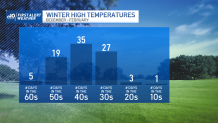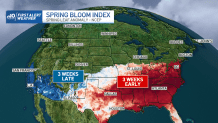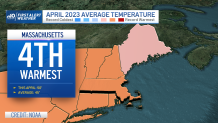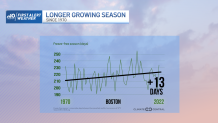For millions of allergy sufferers, climate change is bringing an earlier and more prolonged allergy season. Blooming plants and leaf out is, overall, occurring earlier than normal and lasting much longer across the United States.
Climate change has been a contributing factor to earlier pollen seasons. Fewer freezing days, warmer winter nights and spring temperatures have caused plants to produce pollen earlier, leading to earlier leaf out and blooms.

According to the USA National Phenology Network, leaf out occurred nearly three weeks ahead of pace across the south, and now Northeast. First Alert meteorologist Tevin Wooten has been tracking this since early February.
Get Boston local news, weather forecasts, lifestyle and entertainment stories to your inbox. Sign up for NBC Boston’s newsletters.
Record warm winter leads into fourth warmest April
January 2023 was the warmest month of January on record for the Commonwealth. To no surprise, winter was the second warmest on record for the state. For seven states across the eastern U.S., this January to April was the warmest January to April period on record. For that same period, it was the second warmest for Massachusetts.

The average temperature April temperature for the United States was 51.4°, which is only slightly above the norm, by .3°F. Though, Massachusetts had its fourth warmest April, with temperatures between 3 and 10° above normal for the region.
In Massachusetts, our average April temperature was 50°F, nearly 5° above normal. It was our warmest April since 2017.

This warmer-than-normal January to April, contributed to fewer days with freezing temperatures, and hard freezes, thus prolonging the growing season, and more surviving allergen-producing plans and crops.
Since 1970, the freeze-free days have grown by 13 days in Boston, Massachusetts.


